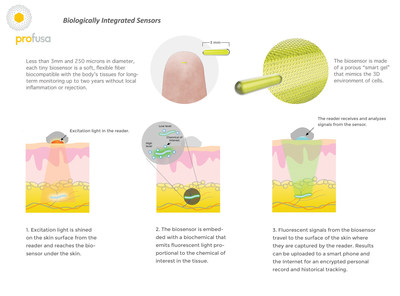LAS VEGAS, Jan. 8, 2016 /PRNewswire/ -- Biointegrated sensors for long-term, continuous tracking of body chemistry may make health and disease monitoring as easy as turning on your smart phone. Unveiled today by Profusa, Inc., of South San Francisco, Calif., tiny bioengineered biosensors will soon enable real-time detection of our body's unique chemistry, providing actionable, medical-grade data for personal and medical use for as long as two years at a time. The company's technology and vision were presented at the CES Digital Health Summit held here.

"In between annual physicals we really don't know what's going on in our body," explained Ben Hwang, Ph.D., Profusa's CEO. "While fitness trackers and other wearables provide insights into our heart rate, respiration and other physical measures, they don't provide information on the most important aspect of our health: our body's chemistry. What if there was a better way of knowing how you're doing how you're really doing?"
According to Dr. Hwang, the company's biosensors will have applications for consumer health and wellness, as well as the management of chronic diseases such as Peripheral Artery Disease (PAD), diabetes, and Chronic Obstructive Pulmonary Disease (COPD). "Aimed at being a leading force in the digital disruption of medicine, Profusa's real-time biosensors are poised to revolutionize healthcare, yielding significantly more insights into one's overall health status and performance than tracking physical parameters alone."
While many of us may struggle to maintain our fitness, others are faced with diabetes and other chronic diseases that affect more than 70 million individuals in the U.S., accounting for more than 75 percent of our healthcare expenditures that's $2 trillion, according to the National Health Council. This is putting the nation's healthcare under even more pressures, with greater calls for consumers to become more health conscious, and the key driver for why the mobile health market alone is expected to reach $41 billion by 2020.
Breaking the Biocompatibility Barrier
With the support of the Transformative Research Award from the National Institute of Health (NIH), funding from the Defense Advanced Research Projects Agency (DARPA), and support from others with a vision for revolutionizing healthcare, Profusa is developing biosensors that provide immediate, actionable information to individuals, physicians, and public health practitioners. Its novel bioengineering approach overcomes the largest hurdle in long-term use of biosensors to access biochemical information in the body: the foreign body response. Placed under the skin with a specially designed injector, each tiny biosensor is a flexible fiber, 3-5 mm long and approximately 500 microns in diameter. Rather than being isolated from the body, Profusa's biosensors work fully integrated within the body's tissue without any metal device or electronics while overcoming the effects of the foreign body response for up to two years.
Tissue-integrating Scaffold
Each biosensor is comprised of a bioengineered "smart hydrogel" (similar to contact lens material) forming a porous, tissue-integrating scaffold that induces capillary and cellular in-growth from surrounding tissue. The smart gel is linked to a light-emitting molecule that continuously signals the presence of a body chemical such as oxygen, glucose, or other biomarker.
Optical Reader
Adhered to the skin's surface or held by hand, a separate optical reader is used to read the fluorescent signal from the embedded biosensor. The reader sends excitation signals through the skin to the biosensor, which then emits fluorescent light proportional to the concentration of molecules of interest. The data is relayed to a smart phone for an encrypted personal record and historical tracking. Data can be shared securely via HIPAA-compliant digital networks with healthcare providers.
Lumee Oxygen Sensing System
Profusa's first medical product, the Lumee Oxygen Sensing System, is aimed at being the only long-term monitoring technology that ensures tissue oxygen levels persist throughout the wound treatment and healing process. Taking as much as a year to heal, if at all, chronic wounds from diabetic ulcers, pressure sores, and reconstructive surgery take a financial toll on patients and the healthcare system.
Oxygen monitoring of localized tissues after surgical repair of blood vessels is an unmet medical need in the treatment of peripheral artery disease (PAD). PAD, in which plaque buildup obstructs arteries causing decreased tissue oxygen, affects 202 million people worldwide, 27 million of whom live in Europe and North America, with an annual economic burden of more than $74 billion in the U.S. alone.
Decreased tissue oxygen levels in the lower limbs of PAD patients can lead to disabled walking, or in more advanced cases, gangrene and amputation. The Lumee system may help salvage limbs from amputation by providing the medical practitioner with a way to continuously measure tissue oxygen levels in the ischemic limb before, during, and after treatment, enabling appropriate therapy to be administered in a timely fashion before advanced symptoms appear. The Lumee system is slated to be available in Europe in early 2016 for use by vascular surgeons and wound-healing specialists.
"When low tissue oxygen is detected early, more treatment options can be considered, and the need for catastrophic amputation can be avoided," said Christopher Owens, MD, MSc, Chief, Section of Vascular Surgery, Assoc. Prof. Surgery, San Francisco Veterans Medical Center, University of California, San Francisco.
Profusa, Inc.
Profusa, Inc. is leading the development of a new generation of tissue-integrated sensors that empowers an individual with the ability to monitor their unique body chemistry in unprecedented ways to transform the management of personal health and disease. Overcoming the body's response to foreign material for long-term use, its technology promises to be the foundational platform of real-time biochemical detection through the development of tiny bioengineered sensors that become one with the body to detect and continuously transmit actionable, medical-grade data for personal and medical use. See http://www.profusa.com for more.

Photo - http://photos.prnewswire.com/prnh/20151231/318690
Logo - http://photos.prnewswire.com/prnh/20151215/296354LOGO
To view the original version on PR Newswire, visit:http://www.prnewswire.com/news-releases/profusa-unveils-first-biointegrated-sensors-for-long-term-continuous-monitoring-of-body-chemistry-300198349.html
SOURCE Profusa, Inc.





